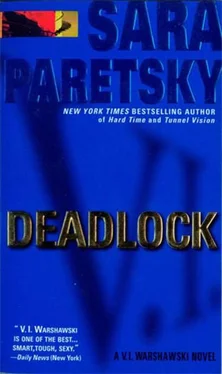As I stood watching, I felt the ship begin to vibrate. The engines had been turned on. Soon the air was filled with their urgent racket. A trail of black diesel smoke drifted upward from the giant funnel. I had no idea how long the engines ran before the ship moved out, but I noticed a couple of seamen at the guy ropes on shore, ready to loose them as soon as the signal was given. I hadn’t come back a minute too early.
I felt very keyed up. I knew I was wasting time on deck when I should have been on the bridge confronting anyone who had returned, but I was very nervous and didn’t know what to say once I got up there. In my heightened state I thought I saw someone swimming away from the port side of the ship. I moved as quickly as I could past the clutter around the self-unloader but didn’t see anything. I stood straining my eyes against the reflecting water and finally saw a figure break the surface twenty yards away, close to the shore.
When I turned back, Bledsoe was just coming on board. He stopped to talk to the second mate, then headed for the bridge without seeing me. I was about to follow when it occurred to me I might be better off just stowing away and presenting myself after castoff. Accordingly, I moved to the back of the pilothouse where a stack of giant oil drums served as both garbage cans and an effective shield from the bridge. I sat down on a metal box, placed my bag against a coil of rope, and leaned back to enjoy the view.
I had momentarily forgotten the figure I’d seen, but now I noticed him-or her-walk out of the water some fifty yards away, on the other side of the elevator yard. A clump of trees soon hid the person from my sight. After that nothing happened for about forty-five minutes. Then the Lucella gave two deep hoots and slowly pulled away from the wharf.
Two gray-green troughs appeared at my feet, the wake of the giant screws, and the distance between the ship and the wharf widened quickly. Actually, the ship didn’t seem to move; rather, the shore appeared to back away from us. I waited another ten minutes, until we were a good mile or two from land and no one would be disposed to turn around to send me back.
Leaving my bag amidst the coiled rope, I made my way up to the bridge. I loosened the gun in its holster and released the safety catch. For all I knew, I was going up to face one or more killers. A few crew members passed me on my way up. They gave me curious stares but didn’t question my right to be there. My heart pounding, I opened the door to the bridge.
Up the flight of narrow wooden stairs. A murmur of voices at the top. I emerged into a busy scene-Winstein was going over charts at the drafting table. A burly, red-haired man with two inches of cigar in his mouth stood at the wheel taking direction from Captain Bemis. “Off the second port island,” Bemis said. “Off the second port island,” the helmsman repeated, turning the wheel slightly to his left.
Bledsoe stood behind, looking on. Neither he nor the captain turned when I came in, but Winstein looked up from the charts and saw me. “There she is,” he said quietly.
The captain turned at that. “Ah, Miss Warshawski. The first mate said you’d turn up.”
“Technically you’re a stowaway, Vic.” Bledsoe gave the glimmer of a smile. “We could lock you in the holds until we get to Sault Ste. Marie.”
I sat down at the round table. Now that I was here my nervous tension receded; I felt calm and in charge. “I only have a rudimentary knowledge of maritime law. I gather the captain is complete master of the ship-that he evaluates any crimes committed under his jurisdiction and dispenses judgment, if any?”
Bemis looked at me seriously. “Technically, yes, as long as the ship is at sea. If some crime was committed on board, though, I’d probably just hang on to the person and turn him over to the regular judiciary at our next port of call.”
He turned to Winstein and told him to take over the bridge for a few minutes. The first mate finished drawing a line on the chart and then got up to stand by the helmsman. We were going through a channel with a lot of little islands planted in it-humps of earth with one or two trees or a scraggly bush clinging to them. The sun glinted off the gray-green water. Behind us, Thunder Bay was still visible with its line of elevators.
Bledsoe and Bemis joined me at the table. “You’re not supposed to come on board without the captain’s permission.” Bemis was serious but not angry. “You don’t strike me as a frivolous person and I doubt you did it frivolously, but it’s still a major breach of maritime custom. It’s not a crime, per se, but I don’t think that’s what you were referring to, was it?”
“No. What I really wanted to know was this: suppose you have someone on board who committed a crime while he was on shore. You find out about it while you’re at sea. What do you do with that person?”
“It would depend in part on what the crime was.”
“Attempted murder.”
Bledsoe’s eyes narrowed. “I assume this isn’t hypothetical, Vic. Do you think one of this crew tried killing someone? Who and why?”
I looked at him steadily. “I was the intended victim. I’m trying to find out for sure that someone here wasn’t after me.”
For a count of ten there was no sound in the small room but the faint throb of the engines. The helmsman kept his eyes in front of him, but his back twitched. Bemis’s jaw set in an angry line.
“You’d better explain that one, Miss Warshawski.”
“Gladly. Last Thursday night Martin Bledsoe here took me out for dinner. I left my car in the elevator yard. While we were gone someone cut through the steering controls with a cutting torch and emptied the brake fluid. It was a miracle that when my car crashed on the Dan Ryan I escaped with minor injuries. An innocent driver was killed, though, and one of his passengers is now paralyzed for life. That’s murder, assault, and a lot of other ugly stuff.”
Bledsoe gave an exclamation. “My God, Vic!” He fished around for something else to say but made several false starts before he could get a coherent thought out. I watched him carefully. Surprise is such an easy feeling to counterfeit. It looked genuine, but…
The captain looked at me with narrowed eyes. “You seem pretty cool about it.”
“Would it be more believable if I lay down on the floor and screamed?”
Bemis made a gesture of annoyance. “I assume I could radio the Chicago police and get some verification of this.”
I pointed to the radio on the port wall. “By all means. A Lieutenant Robert Mallory can tell you anything you want to know.”
“Can you give us some more detail on what happened?” That was Bledsoe, finding his voice and his authoritative manner.
I obliged with as much of the accident as I could recall.
“Now what makes you think someone on the Lucella might be involved?”
“There’s a limited universe of who could have done it,” I explained. “Only a few people knew I was down there. Only a few could identify my car.”
“How do you figure that?” That was the captain again. “There are a lot of vandals down at the Port and this frankly sounds like vandalism.”
“Captain, I don’t know what your exposure to vandals is, but I see a lot of them. I don’t know of any vandal who goes around with a cutting torch and a ratchet wrench to disable cars. It’s a lengthy procedure with a very high risk of getting caught, and there’s no point to it. Especially in a place like a grain elevator, which is hard to get to.”
Bemis’s brow creased. “You think just because the Lucella was tied up there we’re implicated somehow?”
“You people and Clayton Phillips are the only ones who knew I was down there… Captain, I’m certain that my cousin was pushed overboard last month-or underboard, to be literal about it. And I know someone else was killed in connection with my cousin’s affairs. The way I see it, the killer is either connected with this ship or with Eudora Grain. Now you’ve got a big machine shop here. I’m sure you have a couple of cutting torches lying around-”
Читать дальше












